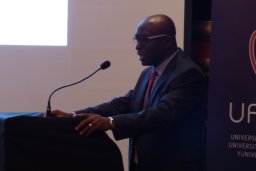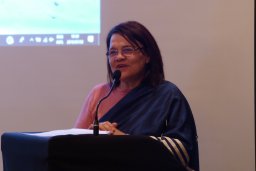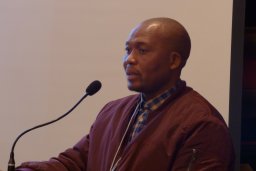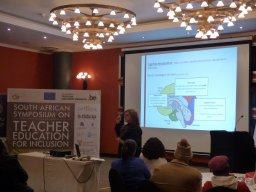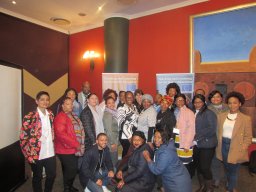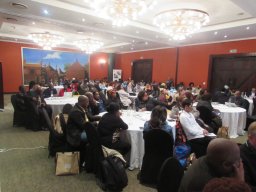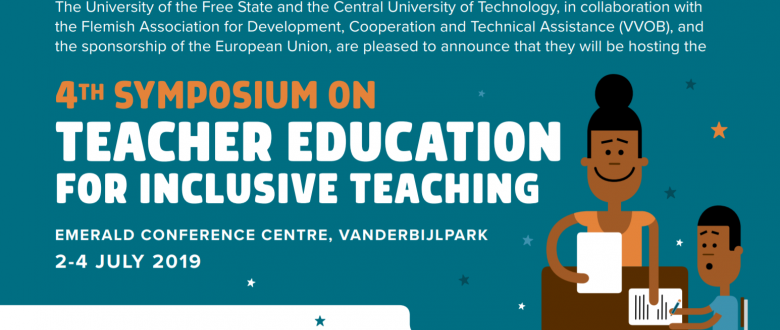
From the 2nd - 4th of July 2019, the University of the Free State (UFS) and the Central University of Technology (CUT) hosted an International Symposium on Teacher Education for Inclusive Teaching, in collaboration with VVOB South Africa. This Symposium is the last one in a series of three under the EU-funded “Teaching and Learning for Inclusive Education” project, TL4IE. This year’s theme ‘Shifting towards Inclusive Mindsets – achieving meaningful participation for all’, was a next step under the bigger theme “from theory to practice”. Indeed, practice and implementation were the main subjects in plenary and panel discussions, breakaway sessions, reflection sessions and networking opportunities. As an important and hopefully sustainable part, a website for open educational resources was launched (FundaOER).
Warming up with a practical Workshop
The Symposium kicked off with a half day practical workshop. In ‘Teaching mental calculation strategies’, Ms. Roselle Hanekom shared some practical, easy-to-implement strategies for maths teachers, based on how the brains work, while Ms. Rita Nel gave insights into the sensory integration of our 7 – yes, 7 – senses, in ‘How using sensory integration can assist in effective teaching and learning. A practical approach’. These two practical sessions were the perfect warm up for the Symposium itself. The only challenge of this afternoon was that about double the expected participants showed up.
Hitting the key notes
With three inspiring key note speakers, the Symposium started off on a very high note. Prof. Kwame Akyeampong was the international guest speaker. As professor of International Education and Development at the Centre for International Education at the University of Sussex, Prof. Kwame Akyeampong, shared his vision on teacher education towards the production of teachers as agents of inclusive practice. He spoke about a holistic approach including knowledge of practice, PLCs and learning from practice (Work-Integrated Learning) and the use of technology to free up teacher time. This key-note also addressed the crucial importance of agency of the teachers.
“We are still excluding too many vulnerable young people”, said Ms. Michelle Mathey, Department of Higher Education (DHET) Director, Teacher Education University Branch, when she shared her thoughts on teacher education for inclusive teaching as the second key note speaker. She addressed the issue of how the higher education sector can develop the right kind of teachers, the difference between knowledge and (21stcentury) skills.
Mr. Jabulani Ngcobo, Acting Director Inclusive Education at the Department of Basic Education (DBE) spoke about the challenges in the sector including Full Service Schools and Special School Resource Centres. As did his colleagues key-note speakers he spoke about the critical issue of teacher agency and resilience.
Focus Sessions
The number of abstracts presented, no less than twenty-two, shows the interest and commitment of researchers and educators. The abstracts were presented in pairs in 4 parallel breakaway sessions, leaving enough time for discussion and reflection. Themes covered included collaboration for inclusive teaching and learning, voices of the marginalised, and classroom practices supporting all learners.
Practice-based collaboration was discussed with a focus on action research and professional learning communities (PLCs). VVOB, under the TL4IE project, profiled results from a PLC Pilot. The presentation from participants of the PLC pilot allowed the teachers to share their experiences and profile the value of PLCs to inclusive teaching and learning.
Universities sharing views and learnings
In an interesting panel discussion, the five universities, valuable partners in the the EU-funded Teaching and Learning for Inclusive Education project, University of the Free State, Central University of Technology, University of Witwatersrand, North West University and Fort Hare University, shared results on how inclusive education is understood by their students. In addition, systemic barriers, inclusion in the basic education curriculum and professional development were discussed.
As part of the TL4IE project, Inclusive Education South Africa (IESA) ran a year-long Teacher Induction pilot. Ms. Charlene Petersen discussed the successes as well as the challenges of this induction programme – which focusses on inclusive practice - aimed at facilitating a smooth transition from university into teaching practice. The programme’s goals are to retain new teachers, boost their morale and collegiality, improve socialisation, and develop a professional identity as an inclusive teacher putting theory into practice.
FundaOER: the important cherry on the cake
FundaOER (Open Education Resources), a South African OER platform, was created by VVOB South Africa as part of the TL4IE project – it is free and open to everyone and aimed at pre-service providers, in-service providers and educators in training or in the classroom. Different types of resources can be found on the platform and more are being added at the moment of writing. Resources range from articles, factsheets, and guides, covering different themes and phases, to video materials like VVOB’s Bambanani video series. Materials on this site mainly originate from IESA and VVOB, however important contributions were already made by other organisations. Moreover, the British Council was present at the Symposium and their project will also contribute to FundaOER. Both VVOB and British Council-led consortia received grants from the EU for Inclusive Education related projects.
Do you have a resource worth sharing? Don't hesitate to fill out the submission form.
Read more
- Key-notes of Prof. Kwame Akyeampong (Sussex university), Ms. Michelle Mathey (DHET), Mr. Jabulani Ngcobo (DBE)
- PLC pilot
- IESA's New Teacher Induction pilot programme
- Curious to see what resources have already been published on the FundaOER platform?





